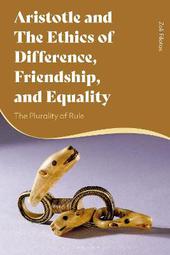
|
Aristotle and the Ethics of Difference, Friendship, and Equality: The Plurality of Rule
Hardback
Main Details
| Title |
Aristotle and the Ethics of Difference, Friendship, and Equality: The Plurality of Rule
|
| Authors and Contributors |
By (author) Dr Zoli Filotas
|
| Physical Properties |
| Format:Hardback | | Pages:216 | | Dimensions(mm): Height 234,Width 156 |
|
| Category/Genre | Western philosophy - Ancient to c 500
Social and political philosophy |
|---|
| ISBN/Barcode |
9781350160866
|
| Classifications | Dewey:171.3 |
|---|
| Audience | | Tertiary Education (US: College) | |
|---|
|
Publishing Details |
| Publisher |
Bloomsbury Publishing PLC
|
| Imprint |
Bloomsbury Academic
|
| Publication Date |
9 September 2021 |
| Publication Country |
United Kingdom
|
Description
Connecting several strands of Aristotle's thought, Zoli Filotas sheds light on one of the axioms of Aristotle's ethics and political philosophy - that every community has a ruler - and demonstrates its relevance to his ideas on personal relationships. Aristotle and the Ethics of Difference, Friendship, and Equality reveals a pluralistic theory of rule in Aristotle's thought, tracing it through his corpus and situating it in a discussion among such figures as Gorgias, Xenophon, and Plato. Considering the similarities and differences among various forms of rule, Filotas shows that for Aristotle even virtuous friends must exercise a version of rule akin to that of slaveholders. He also explores why Aristotle distinguishes the hierarchical rule over women from both the mastery of slaves and the political rule exercised by free and equal citizens. In doing so, he argues that natural and social differences among human beings play a complex, and troubling, role in Aristotle's reasoning. Illuminating and thought-provoking, this book reveals Aristotle's ambivalence about political relations and the equal treatment they involve and offers an engaging inquiry into how he understood the common structures of human relationships.
Author Biography
Zoli Filotas is Assistant Professor of Philosophy at the University of South Dakota, USA.
ReviewsThis engaging, elegant, and persuasive book considers how Aristotle conceived of 'rule' both in daily, interpersonal interactions, and in larger political structures, arguing that he thought it was vital to both. Filotas explores important questions concerned with equality, justice and friendship that will resonate with the contemporary reader. * Marguerite Deslauriers, Professor of Philosophy, McGill University, Canada *
|